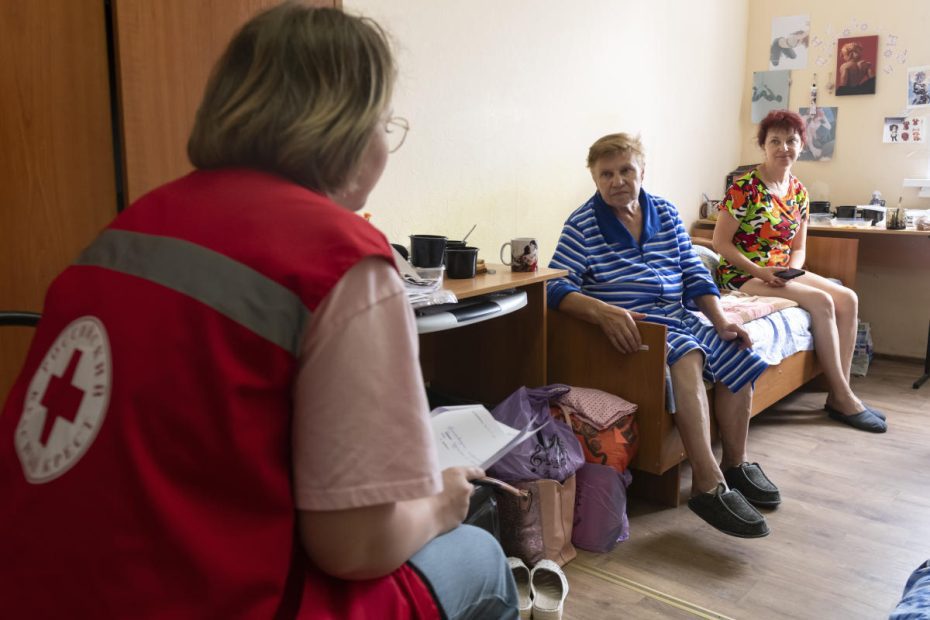KYIV, Ukraine (AP) — An official in Russia's Kursk border region on Monday urged more residents to evacuate due to the “very tense situation” in the area, where Russian troops are still rushing to respond to a surprise attack from Ukraine after nearly a week of heavy fighting.
According to Russian emergency services, more than 76,000 people have fled the Kursk region. On August 6, Ukrainian troops and tanks crossed the border, reportedly penetrating as far as 30 kilometers (19 miles) into Russia and causing unrest.
The governor of the Belgorod region, bordering Kursk, also announced the evacuation of people from a district near the Ukrainian border. He described the situation as “alarming” on Monday morning, but gave no details.
Ukrainian forces quickly rolled into the town of Sudzha, about 10 kilometers (6 miles) across the border, after the attack. They reportedly still hold the western part of the town, where a key natural gas transit station is located.
The Ukrainian operation is being conducted under strict secrecy and its goals — notably whether Kiev’s forces are seeking to hold territory or carry out hit-and-run attacks — remain unclear. The stunning maneuver, which caught Kremlin forces off guard, counters Russia’s relentless efforts in recent months to breach Ukrainian defenses at select points along the front line in eastern Ukraine.
Russia has seen incursions into its territory before during the nearly 2 1/2-year war, but the invasion of the Kursk region marked the largest attack on its territory since World War II, embarrassing President Vladimir Putin and marking a milestone in the hostilities. It also marks the first time that the Ukrainian military has led an invasion rather than pro-Ukrainian Russian fighters.
The advance has dealt a blow to Putin’s attempts to portray life in Russia as largely untouched by the war. State propaganda has tried to downplay the attack, emphasizing the authorities’ efforts to help residents of the region and distracting from the military’s failure to prepare for and quickly repel the attack.
Kursk residents recorded videos complaining about having to flee the border region, leaving their belongings behind and begging Putin for help. But Russia's state-controlled media kept any expressions of discontent strictly under wraps.
Retired General Andrei Gurulev, a member of the lower house of the Russian parliament, criticized the army for failing to properly protect the border.
He noted that while the army has laid minefields in the border area, it has failed to deploy sufficient forces to block enemy attacks.
“Unfortunately, the group of troops that protected the border did not have their own intelligence services,” he said on his messaging app channel. “Nobody wants to see the truth in reports, everyone just wants to hear that everything is fine.”
Pasi Paroinen, an analyst at the Finland-based open-source intelligence service Black Bird Group, which has been monitoring the war, said the most serious phase of the Ukrainian invasion is likely to begin now, as Russian reserves enter the fight.
He said that “if the Ukrainians want to advance further than where they are now, it will be a tough battle, unlike the opening moments of this offensive.”
According to the Institute for the Study of War, Ukraine's advance into Russian territory “challenges the operational and strategic assumptions” of Kremlin forces.
It could force Russia to deploy more military assets along the long border between the two countries, the Washington think tank said in an assessment Sunday evening.
The Russian forces that responded to the invasion were described as “hastily assembled and dispersed.”
In other developments:
— The International Atomic Energy Agency said a fire near the Russian-occupied Zaporizhia nuclear power plant in Ukraine had “no impact” on the safety of the facility.
According to the UN agency, radiation levels at one of the world's ten largest nuclear power plants remain unchanged.
Russia and Ukraine blamed each other for the fire in a cooling tower outside the plant's grounds. The IAEA chief said Sunday night that the war continues to endanger the Zaporizhia plant.
“These reckless attacks jeopardize nuclear safety at the plant and increase the risk of a nuclear accident. They must stop now,” said Rafael Mariano Grossi.
___
Follow AP's coverage of the war in Ukraine at https://apnews.com/hub/russia-ukraine

